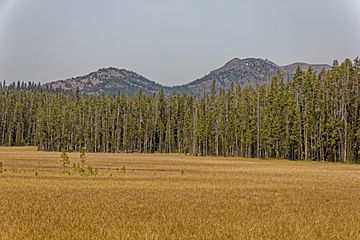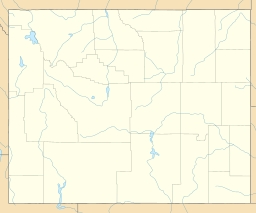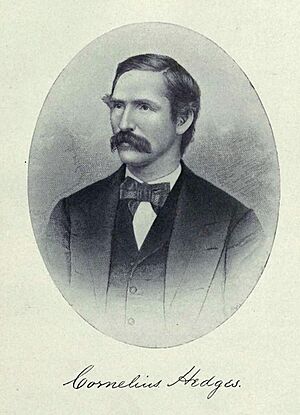Hedges Peak facts for kids
Quick facts for kids Hedges Peak |
|
|---|---|

Hedges Peak (left) and Dunraven Peak (right)
|
|
| Highest point | |
| Elevation | 9,669 ft (2,947 m) |
| Geography | |
| Parent range | Washburn Range |
| Topo map | USGS Mount Washburn |
Hedges Peak is a mountain peak located in the Washburn Range within Yellowstone National Park. This peak stands at an elevation of about 9,669 feet (2,947 meters) above sea level. It is a notable feature in the park's landscape. The mountain was named in 1895 to honor a key figure in the history of Yellowstone.
Contents
The Story Behind the Name
Hedges Peak was named after Cornelius Hedges (1837–1907). He was an important person who helped make Yellowstone National Park a reality. A geologist named Arnold Hague gave the peak its name in 1895. Before that, in 1883, another geologist, J.P. Iddings, had called it Surprise Peak.
Who Was Cornelius Hedges?
Cornelius Hedges was a lawyer from Montana. He was also a member of a very important trip called the Washburn–Langford–Doane Expedition in 1870. This expedition explored the area that would later become Yellowstone National Park. Hedges wrote about his experiences on this trip in the Helena Daily Herald newspaper. His writings helped convince people that this special area needed to be protected.
The Washburn Expedition
The Washburn–Langford–Doane Expedition was a group of explorers who traveled through the Yellowstone region. They were led by Henry D. Washburn, the Surveyor General of Montana, and Nathaniel P. Langford. Lieutenant Gustavus C. Doane of the U.S. Army also joined them. Their goal was to explore and map the area.
The expedition spent many weeks exploring the geysers, hot springs, and amazing landscapes. What they saw was so unique and beautiful that they believed it should be preserved for everyone.
Creating Yellowstone National Park
The stories and reports from the Washburn Expedition, including those from Cornelius Hedges, were very important. They helped show the United States Congress how special the Yellowstone area was. Because of these efforts, on March 1, 1872, President Ulysses S. Grant signed a law. This law created Yellowstone National Park, making it the first national park in the world. This meant the land would be protected and kept wild for future generations.
 | Delilah Pierce |
 | Gordon Parks |
 | Augusta Savage |
 | Charles Ethan Porter |



